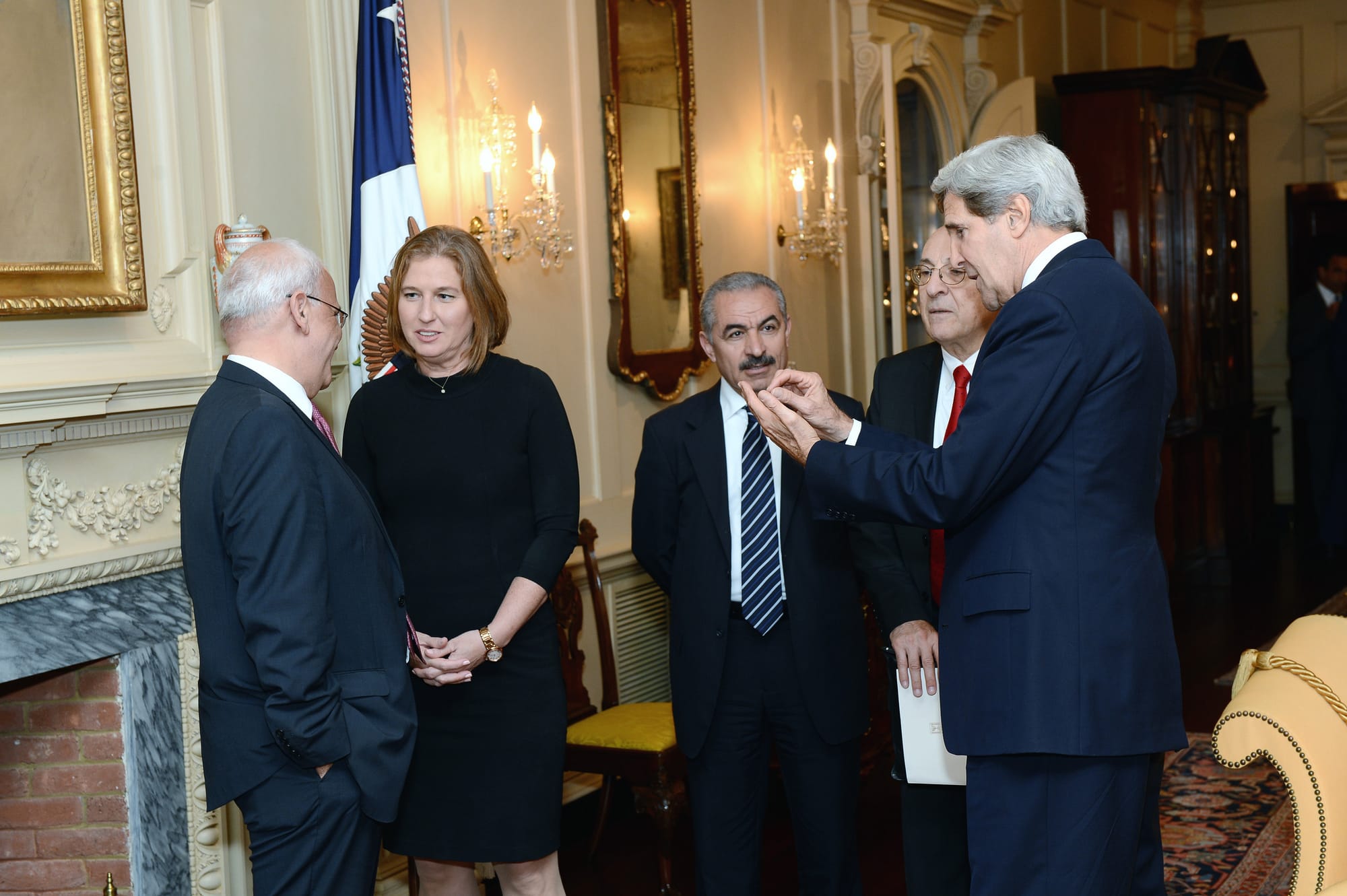When Israel-Palestine Peace Talks Falter Again, Who is to Blame?

Secretary Kerry Hosts an Iftar for the Israeli Justice Minsiter Livni and Palestinian Chief Negotiator Erekat // Credit: State Department via Flickr

Imagine, for a moment, President Obama, Palestinian Authority President Abbas, and Israeli Prime Minister Netanyahu sauntering about Camp David—readying to wrap up nine months of zealous deliberations and fervid dialogue with a few strokes of the pen. Next, envisage PM Netanyahu in Jerusalem, President Abbas in the West Bank, and President Obama in D.C. —all acknowledging the break-up (not breakthrough) of the recent peace talks.
As of now, the latter scenario seems more reasonable. Indeed, the recently resuscitated negotiations between Israel and Palestine have begun to flounder already. But there is plenty of blame to go around. As it happens, the fault for this can be ascribed to all the parties involved.
For Israel’s part, it has released prisoners. Now, one may retort, was the release of prisoners not a gesture of goodwill? To be frank, no. Israel released 26 Palestinian prisoners—all of whom were supposed to be released in 1999 after the Sharm el Sheikh talks—not to secure the faith of Palestine, but because it wanted to continue its pursuit of settlements. Israel and Palestine agreed that if the former began releasing Palestinian prisoners (another 78 will be freed in the coming months) the latter would permit the construction of settlements for the time being. However, such a bargain is detrimental to the future of the peace process.
The grounds upon which Israel is planning to lay its settlements lie in the West Bank and happen to be part of the fields Palestine was intending to acquire through the peace talks. In other words, they are off the market for Palestine; something Mark Regev, a spokesperson for PM Netanyahu, confirmed by announcing that the lands upon which settlements are beginning to be laid are not going to be part of any peace agreement. As a result, any deal will leave a Palestinian state with but a soupçon of land; leaving Abbas with no choice but to reject the offer.
For Palestine’s part, it continues to broadcast messages of scorn for Israelis. Just recently, President Abbas declared, “In a final resolution, we would not see the presence of a single Israeli—civilian or soldier—on our lands.” There can be no trust between the two groups, and thus no deal, if President Abbas sustains his aversion towards Israelis.
What’s more is that the Palestinian Parliament is under the sway of Hamas, not Abbas’s more moderate Fatah party. Hamas, which is recognized as a foreign terrorist organization by the U.S, the EU, and others, is not looking for a two-state agreement. Instead, Hamas wishes (and has said so publically) to liquidate Israel entirely, seeking to replace it with an Islamic nation.
In point of fact, Hamas opposes the current negotiations and has called it an Israeli scheme to slowly grab Palestinian land. At a press conference in Gaza, Hamas leader Mahmoud al-Zahar said, “We renew our opposition to the absurd negotiations and we consider it no more than an attempt to beautify Israel and its image before the international community.” With Hamas against the negotiations, Abbas will have a hard time appearing firm at the peace talks, will be offered an “absurd” deal, and will be forced to walk away.
For the United States’ part, it has done little to assure Palestine it will be an unbiased mediator in the negotiations and it has set a prolonged timetable for these talks. As if the U.S hasn’t ever shown its fondness for Israel, Secretary of State Kerry appointed Martin Indyk, co-founder of a pro-Israel think tank, as its special envoy for the talks. It’s no wonder why many Palestinians are not optimistic about these talks. For years they’ve been handed inadequate deals supported by a pro-Israel America. They have every reason to believe the same will happen this time around as well.
In addition, Secretary of State Kerry welcomed a nine-month timeline for peace talks. If any headway is to be made there must be a sense of urgency. Currently, Israel and Palestine are staving off earnest negotiations. Both sides must discern that this quarrel has gone on for far too long and that a peace deal is needed now.
Not Israel, Palestine, or the U.S. has come to the table ready to talk. Both Israel and Palestine were not even willing to come to the negotiations, but did so anyways because of the diplomatic pressure the United States put on them. As a result, we have two parties who currently seek no deal because of a lack of trust and a track record of failed negotiations; and a third party that is not only evidently biased but also playing its cards wrong by allowing passive rather than passionate negotiations. Disintegration is markedly near.
But what can be done in the future (assuming there will be more negotiations)? Either allow Israel and Palestine to jumpstart negotiations by themselves, as it will be a sign that both sides not only trust each other but, furthermore, feel compelled to come to an accord; or, call for a less directly aligned mediation council such as the Middle East Quartet, made up of the UN, the U.S, the EU, and Russia, to revive talks. By the same token, a now feeling must be embraced. Without these preconditions, Israel will continue to risk the chances of a future agreement by continuing to build illegal settlements, Abbas will continue to show disdain for Israelis, Hamas will keep alive its opposition to peace talks, and Palestinians and Israelis will continue to be burgled of concord.



